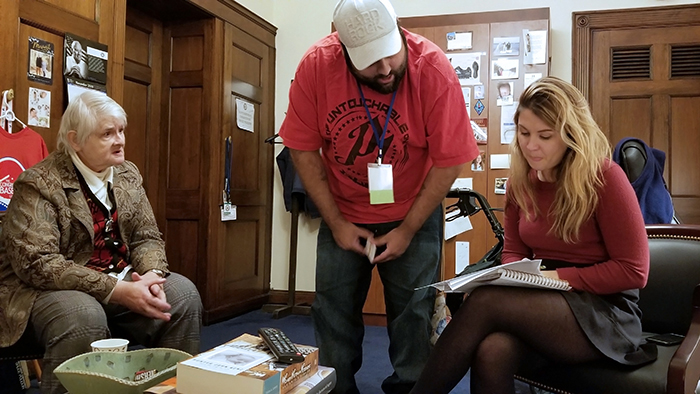
CCIDS and CAC Present Research and Work-in-Progress at AUCD Conference
Three CCIDS faculty members; Co-Chairs of the CCIDS Community Advisory Committee (CAC); and a NH-ME LEND trainee recently presented their research or reported on their work-in-progress at the 2018 Association of University Centers on Disabilities (AUCD) Conference in Washington, DC. Please visit our Facebook photo gallery for more photos from the conference. (Photo above shows CAC Co-Chairs, Maryann Preble and Kile Pelletier explaining their poster content to Allison Behuniak, health staffer to Rep. Bruce Poliquin (R-ME), on Capitol Hill (Photo courtesy of Alan Cobo-Lewis).
Founded in 1971, AUCD is a network of interdisciplinary centers advancing policy and practice for and with individuals with intellectual, developmental and other disabilities, their families, and communities. The 2018 conference theme, We All Belong Here! Achieving Inclusive Communities, emphasized that all human beings have value and a right to be included in their communities. This means opportunity, access, and equity in education, housing, employment, healthcare, faith communities, transportation, activities, and all aspects of community living.
CCIDS faculty members, Elizabeth DePoy, Ph.D., and Stephen Gilson, Ph.D., partnered with Richard Brzozowski, Ph.D., Maine AgrAbility project director, on a peer-reviewed poster presentation, Aging Farmers with Disabilities: From Omission to Belonging.
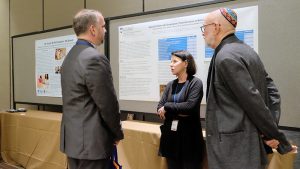 Abstract: This poster session presents research investigating assets and unmet needs of aging farmers with disabilities, a diversity population that is often omitted from research, analysis, policy, and services. The session will detail the research and then, based on the findings, attendees will be guided through analysis and discussion of how AUCD can respond.
Abstract: This poster session presents research investigating assets and unmet needs of aging farmers with disabilities, a diversity population that is often omitted from research, analysis, policy, and services. The session will detail the research and then, based on the findings, attendees will be guided through analysis and discussion of how AUCD can respond.
Kile Pelletier and Maryann Preble, Co-Chairs of the CCIDS Community Advisory Committee, co-presented their peer-reviewed poster, Building Strong Bonds: How the Maine UCEDD and Community Advisory Committee Support Each Other in Our Work.
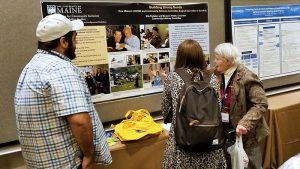 Abstract: In 1990, a Consumer Advisory Committee (CAC) assembled and created a mission statement for what would become the University of Maine Center for Community Inclusion, University Affiliated Program. Their vision of inclusion and interdependence and recognition of the inherent worth and talent of people with intellectual and developmental disabilities continues today. The CAC Co-Chairs will describe how strong bonds between the Maine UCEDD and CAC sustain our work together.
Abstract: In 1990, a Consumer Advisory Committee (CAC) assembled and created a mission statement for what would become the University of Maine Center for Community Inclusion, University Affiliated Program. Their vision of inclusion and interdependence and recognition of the inherent worth and talent of people with intellectual and developmental disabilities continues today. The CAC Co-Chairs will describe how strong bonds between the Maine UCEDD and CAC sustain our work together.
Jodie Hall, B.S., a 2017-2018 New Hampshire-Maine Leadership Education in Neurodevelopmental and Related Disabilities (NH-ME LEND) Program trainee, partnered with the Maine Coalition Against Restraint and Seclusion on the peer-reviewed poster, Educational Videos about Restraint and Seclusion.
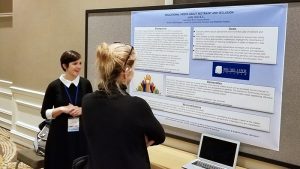 Abstract: The Maine Coalition Against Restraint and Seclusion (C.A.R.S.) is a group of stakeholders whose mission is to prevent the overuse of restraint and seclusion within the educational setting. As part of Hall’s training with the New Hampshire-Maine LEND Program, she worked with C.A.R.S. to update their resources and parent education materials. The outcome is a series of short informational videos which may be accessed online.
Abstract: The Maine Coalition Against Restraint and Seclusion (C.A.R.S.) is a group of stakeholders whose mission is to prevent the overuse of restraint and seclusion within the educational setting. As part of Hall’s training with the New Hampshire-Maine LEND Program, she worked with C.A.R.S. to update their resources and parent education materials. The outcome is a series of short informational videos which may be accessed online.
Alan Kurtz, Ph.D., Rae Sonnenmeier, Ph.D., Elizabeth Humphreys, Ph.D., and Susan Russell, M.S., representing faculty and leadership from the New Hampshire-Maine Leadership Education in Neurodevelopmental and Related Disabilities (NH-ME LEND) program, presented their peer-reviewed poster, Coaching LEND Faculty in Implementing Team-Based Learning Across Two States: Lessons Learned Over Four Years.
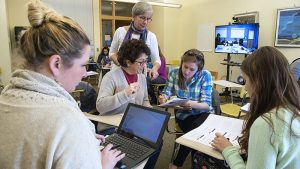 Abstract: This poster describes the implementation of team-based learning (TBL) in the didactic seminar component of the NH-ME LEND program over four years. TBL has been found to be an effective instructional method, fostering communication, collaboration, and conflict negotiation among interdisciplinary teams. We describe the process of coaching a large faculty across two states (NH and ME) to implement TBL, faculty perceptions with TBL, lessons learned, and quality improvement strategies.
Abstract: This poster describes the implementation of team-based learning (TBL) in the didactic seminar component of the NH-ME LEND program over four years. TBL has been found to be an effective instructional method, fostering communication, collaboration, and conflict negotiation among interdisciplinary teams. We describe the process of coaching a large faculty across two states (NH and ME) to implement TBL, faculty perceptions with TBL, lessons learned, and quality improvement strategies.
All AUCD Conference photos are courtesy of Alan Cobo-Lewis (CCIDS) and/or Crystal Pariseau and Anna Costalas (AUCD). The team-based learning photo is courtesy of NH-ME LEND.

